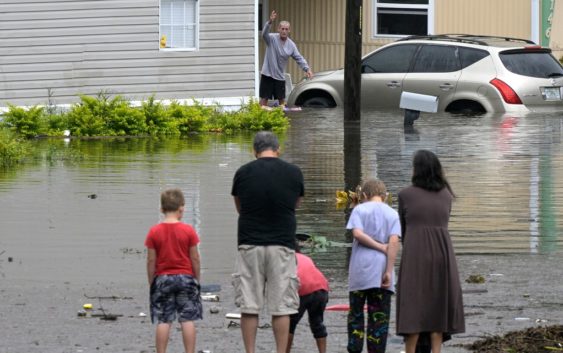- South and Midwest face potentially catastrophic rains and floods while reeling from tornadoes
- Deadly 2024 hurricanes prompt WMO to retire three names
- Body recovered in North Carolina identified as East TN man who has been missing ever since Hurricane Helene
- Report: Coastal flooding could threaten 1.4 million homes by midcentury
- Caught on camera | Tornado touches down in Missouri
Florida faces months of cleanup after Hurricane Ian

We still don’t know the full extent of the damage Ian caused as it tore across Florida, but it is extensive.
FORT MYERS BEACH, Fla. — Hurricane Ian was over southwest Florida for only a few hours.
It will take months to clean up all the damage. Maybe longer. And some of the destruction can’t be cleaned up at all.
From trees getting ripped out of the ground to signs being ripped apart, traffic lights crashing onto roadways and some buildings simply being destroyed, the impact was everywhere and almost nothing was spared. The only difference between one place and the next was the severity of the problems.
“We will get through this,” said Vice Mayor Richard Johnson of Sanibel, Florida. “And we’ll come out on the other side better than we were going in.”
Perhaps, but it will be a massive undertaking, ranging from the cosmetic to the crucial and everything in between.
Fort Myers Beach is, quite simply, destroyed. Businesses are gone. Jobs are obviously lost, at least temporarily. The cleanup will take weeks and that will almost certainly have to precede any rebuilding efforts.
“Our entire staff is safe and although the restaurant sustained incredible damage the structure of the building is intact,” the ownership of Nervous Nellie’s, a seafood restaurant on the beach, said in a statement. “We are hoping to work our way through this and be back stronger than ever.”
Around the region — Naples, Fort Myers, Sanibel — the magnitude of the damage is impossible to ignore. Along U.S. 41, the main road in the region, countless signs outside businesses are damaged, torn or just gone. The steel posts holding street signs in the ground are bent backward, no match for Ian’s wind and force. The doors to storage-unit garages were twisted, sending the belongings inside some of the spaces flying into the air. The majority of traffic lights are out, wires dangling to the road below in some cases.
And in one instance, a metal traffic sign directing drivers toward Interstate 75 got crushed by an electronic traffic sign warning drivers about a closed lane.
“I’ve seen some things,” said Clark Manchin, a construction project manager, as he assessed the mess. “I’ve never seen that.”
Patience was quickly wearing thin. A 7-Eleven worker pleaded with people who filled her store: No $20s, please. Small bills only. “If I run out of change, we have to close,” she pleaded. There was no gas, no hot food and — because there was no running water — no coffee or bathrooms, either.
“I didn’t take this as seriously as I should have,” Mark Crow of Naples said. “I didn’t stock up. I didn’t board up. It’s a mess, man. It’s bad.”
Much of the damage, thankfully, was just cosmetic. The 150-foot-high (50-meter), 250-yard (220-meter) deep nets ringing a Top Golf facility in Fort Myers were shredded, swaying in the afternoon breeze, not far from where a shredded American flag remained atop a pole at an office complex. At Florida Gulf Coast University, a set of bleachers — once on the sideline of the soccer field — blew halfway across the pitch and wound up crushing one of the goals.
Other damage was far worse. At an RV park in Fort Myers, debris from a destroyed golf cart floated in deep standing water Thursday, long after the storm cleared. Downed power lines and the destroyed poles they were attached to blocked the entrance. And down the street was a barn-style building that had been under construction. Its walls collapsed, the roof pinning the shredded lumber on the ground.
The damage assessments, and the cleanup, are just beginning.
“We have to be patient,” Sanibel Councilmember John Henshaw said. “We have to start looking at where are we going to stay and live for a significant period of time. Don’t know exactly what that is. We’ll learn more as we go through this process.”